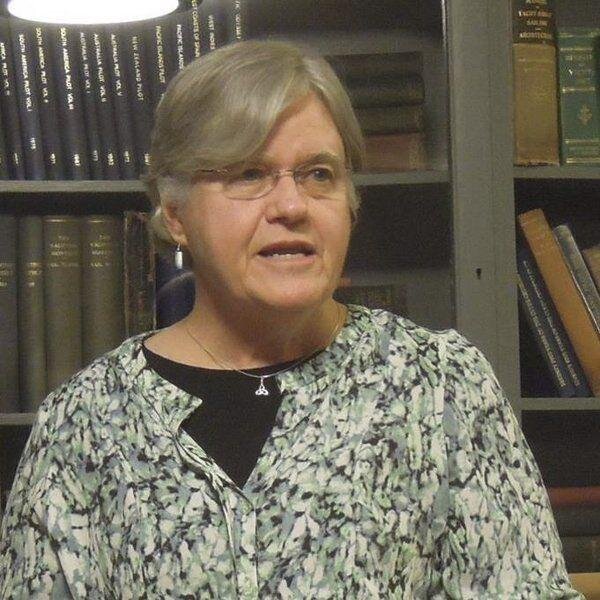Poets Laureate Across Massachusetts
A Note from the Interviewer, Alice Kociemba
Like many towns across the Commonwealth who have established a poet laureate position, participating in the life of the community includes not only writing an occasional poem, but also judging local poetry contests that collaborate with historical societies. Ellie O’Leary, Amesbury’s Poet Laureate has done both. Her poem, “Three Firsts,” celebrated the inauguration of Mayor Kassandra Gove, the youngest and first woman mayor of Amesbury.
Ellie has also created poetry programming that is focused on appreciation as well as writing. Poetry reading groups are often more inclusive than writing workshops alone. From my experience of facilitating an eleven-year monthly poetry group at the Falmouth Public Library, reading accomplished poets, like Elizabeth Bishop who Ellie esteems and admires, helps poets subtly absorb aspects of craft that enhances a poet’s own writing. So perhaps, the distinction between appreciation and creation of one’s own poetry isn’t accurate.
Meet Ellie O’Leary, Amesbury’s Poet Laureate
When did your city or town decide to establish a poet laureate position? Is there a length of time the poet laureate serves?
The Amesbury Cultural Council and the John Greenleaf Whittier Home Association created the poet laureate program in 2015. Amesbury’s first poet laureate, Lainie Senechal, served during 2016 and 2017. Our second poet laureate, Stephen Wagner, held the position in 2018 and 2019. I’m poet laureate for the years 2020 and 2021. It is a two- year position, renewable for a 2nd two-year term.
What was the selection process like? (Who was involved, who made the decision?) Did the city/town have requirements and goals for the position? If so, how do they reflect your own priorities and initiatives?
The Amesbury Cultural Council has a poet laureate committee. The position was advertised in the local paper as well as the Cultural Council’s social media. Each person who applied went to an interview.
Among the national poets laureate, which initiative have you most admired?
I am a huge Elizabeth Bishop fan, although when she was poet laureate the position was called consultant in poetry. The current poet laureate, Joy Harjo, has already published an anthology of indigenous poets.
Have you been in touch with other poet laureates around the Commonwealth? What lessons have you applied to your own tenure?
I have not reached out specifically to other poets laureate in the state, but some of them have contacted me. I have tried to attend their online readings, but this fall has been more of a family time for me. I’m also in contact with the Portsmouth Poet Laureate.
To what community organizations and facilities do you bring poetry (i.e., schools, senior centers, libraries, health, mental health, addiction and correctional facilities)?
My plan was to move the Amesbury Monthly Poetry Readings to our Senior Center (from the library) because of accessibility issues. We have now gone to Zoom readings because of the pandemic. We will meet at the Senior Center when we meet in-person again. The poet laureate is also involved with an annual high school poetry contest, conducted in conjunction with the John Greenleaf Whittier Home, a historic landmark here.

What do you think poetry can do in the civic sphere? Have you written occasional poems for your city or town?
In the civic sphere, poetry can offer succinctness that is not available in other writing. Even people who say they don’t “get” poetry will sometimes find themselves reading or quoting it in stressful times. I wrote an occasional poem for the mayoral inauguration, which I believe, is becoming a tradition now. My predecessor wrote a series of poems commemorating the Amesbury Tri-Centennial, which he has made into a book.
What events have you organized, physically or virtually? Do you find more engagement in your city/town with reading/appreciation events or writing/creative events?
I’m now doing the monthly poetry readings on Zoom. This has allowed me to feature poets from farther away, but attendance is down. I am planning to do a series of poetry workshops, but it has been recommended to me that I plan a poetry appreciation course instead of one focused on writing. I’ll start with appreciation and then possibly add a writing class.
What is your favorite question that people have asked you about poetry?
Poetry? How on earth did you get into that?
If someone in your city/town wanted to become more involved in poetry, what would you recommend to them?
Look for readings and workshops to attend. Even though they are online now, there are many of them. To find them, follow the Amesbury Poet Laureate on Facebook (and similar laureate pages in the Commonwealth), ask to be on the email list for the John Greenleaf Whittier Home, and the Joppa Flats Audubon Education Center. Their current poet laureate, Lainie Senechal is our first poet laureate. Although they are not doing poetry readings now, I’m sure they will again.

Amesbury’s Poet Laureate, Ellie O’Leary, grew up in the village of Freedom, Maine and writes about it from many angles. Her writing has brought her opportunities that include hosting a radio show, teaching poetry as well as organizing a new writing program at an Adirondacks retreat center, and earning an MFA in Maine’s Stonecoast program. She received the Maine Writers & Publishers Alliance’s Martin Dibner Memorial Fellowship in poetry in 2013. Ellie is the author of Breathe Here (North Country Press, 2020). Her memoir Up Home Again is due out, also with North Country Press, in 2021.

Alice Kociemba is co-editor of From the Farther Shore: Discovering Cape Cod and the Islands Through Poetry, which will be published by Bass River Press (an imprint of the Cultural Center of Cape Cod) in 2021. She is the author of Bourne Bridge (Turning Point, 2016), and is the Founding Director of Calliope Poetry for Community. Alice lives in Falmouth, MA, with her husband, Rich Youmans.
